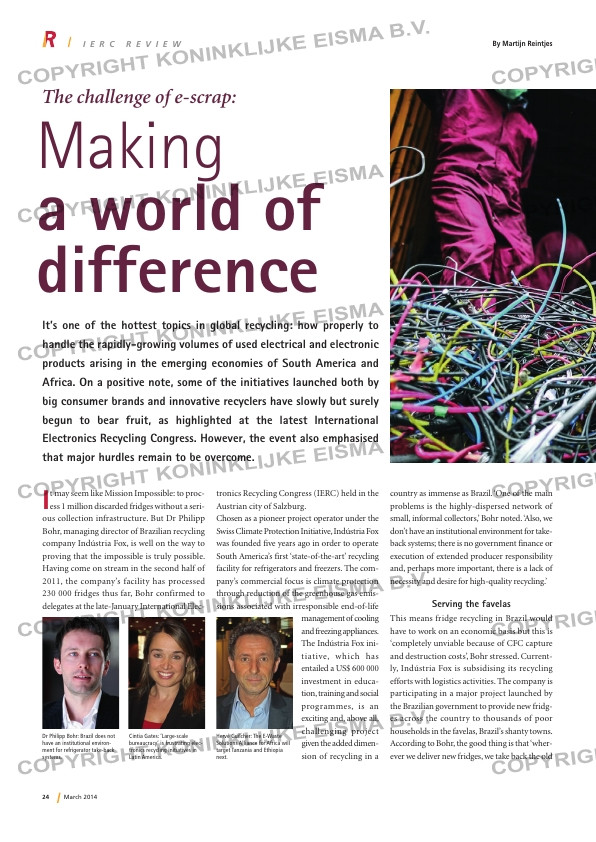Page 24 from: March 2014

24 March 2014
Making
a world of
difference
It may seem like Mission Impossible: to proc-ess 1 million discarded fridges without a seri-
ous collection infrastructure. But Dr Philipp
Bohr, managing director of Brazilian recycling
company Indústria Fox, is well on the way to
proving that the impossible is truly possible.
Having come on stream in the second half of
2011, the company’s facility has processed
230 000 fridges thus far, Bohr confirmed to
delegates at the late-January International Elec-
tronics Recycling Congress (IERC) held in the
Austrian city of Salzburg.
Chosen as a pioneer project operator under the
Swiss Climate Protection Initiative, Indústria Fox
was founded five years ago in order to operate
South America’s first ‘state-of-the-art’ recycling
facility for refrigerators and freezers. The com-
pany’s commercial focus is climate protection
through reduction of the greenhouse gas emis-
sions associated with irresponsible end-of-life
management of cooling
and freezing appliances.
The Indústria Fox ini-
tiative, which has
entailed a US$ 600 000
investment in educa-
tion, training and social
programmes, is an
exciting and, above all,
challenging project
given the added dimen-
sion of recycling in a
country as immense as Brazil. ‘One of the main
problems is the highly-dispersed network of
small, informal collectors,’ Bohr noted. ‘Also, we
don’t have an institutional environment for take-
back systems; there is no government finance or
execution of extended producer responsibility
and, perhaps more important, there is a lack of
necessity and desire for high-quality recycling.’
Serving the favelas
This means fridge recycling in Brazil would
have to work on an economic basis but this is
‘completely unviable because of CFC capture
and destruction costs’, Bohr stressed. Current-
ly, Indústria Fox is subsidising its recycling
efforts with logistics activities. The company is
participating in a major project launched by
the Brazilian government to provide new fridg-
es across the country to thousands of poor
households in the favelas, Brazil’s shanty towns.
According to Bohr, the good thing is that ‘wher-
ever we deliver new fridges, we take back the old
I E R C R E V I E W By Martijn Reintjes
The challenge of e-scrap:
It’s one of the hottest topics in global recycling: how properly to
handle the rapidly-growing volumes of used electrical and electronic
products arising in the emerging economies of South America and
Africa. On a positive note, some of the initiatives launched both by
big consumer brands and innovative recyclers have slowly but surely
begun to bear fruit, as highlighted at the latest International
Electronics Recycling Congress. However, the event also emphasised
that major hurdles remain to be overcome.
Dr Philipp Bohr: Brazil does not
have an institutional environ-
ment for refrigerator take-back
systems.
Cintia Gates: ‘Large-scale
bureaucracy’ is frustrating elec-
tronics recycling initiatives in
Latin America.
Hervé Guilcher: The E-Waste
Solutions Alliance for Africa will
target Tanzania and Ethiopia
next.
RI-2-2014-IERC.indd 24 05-03-14 15:11



